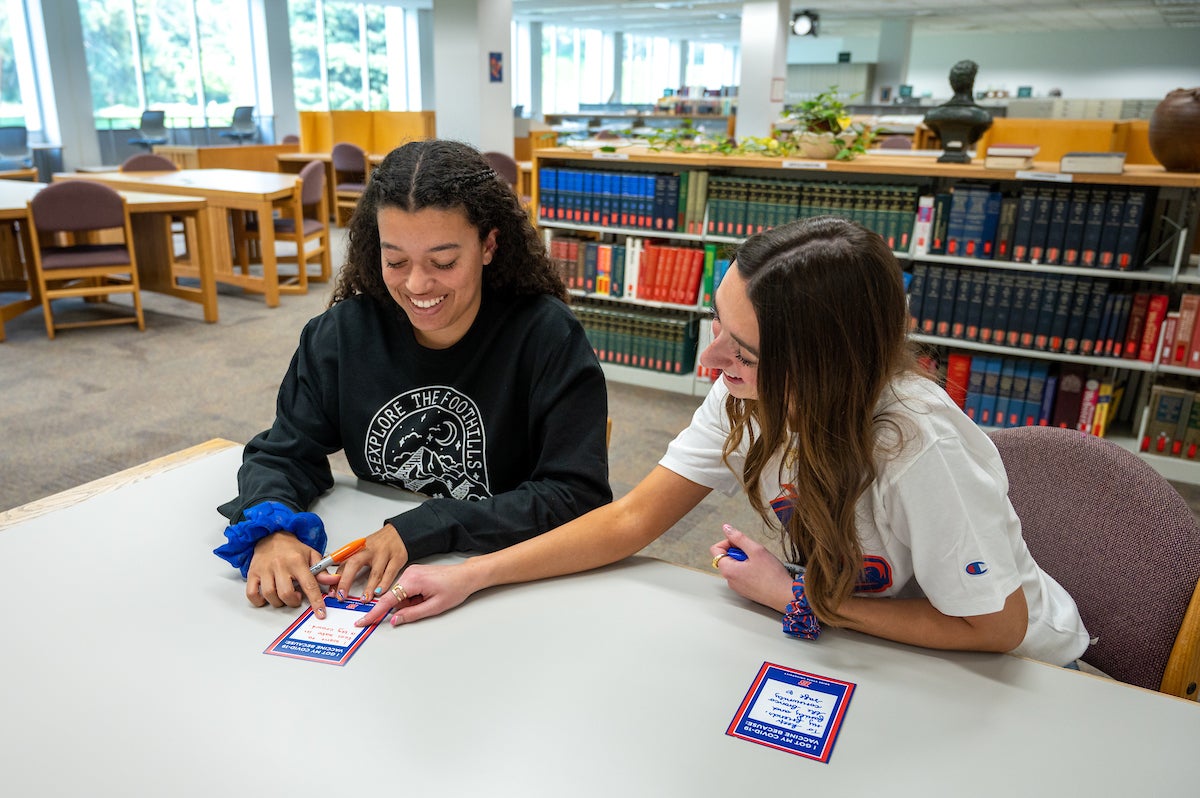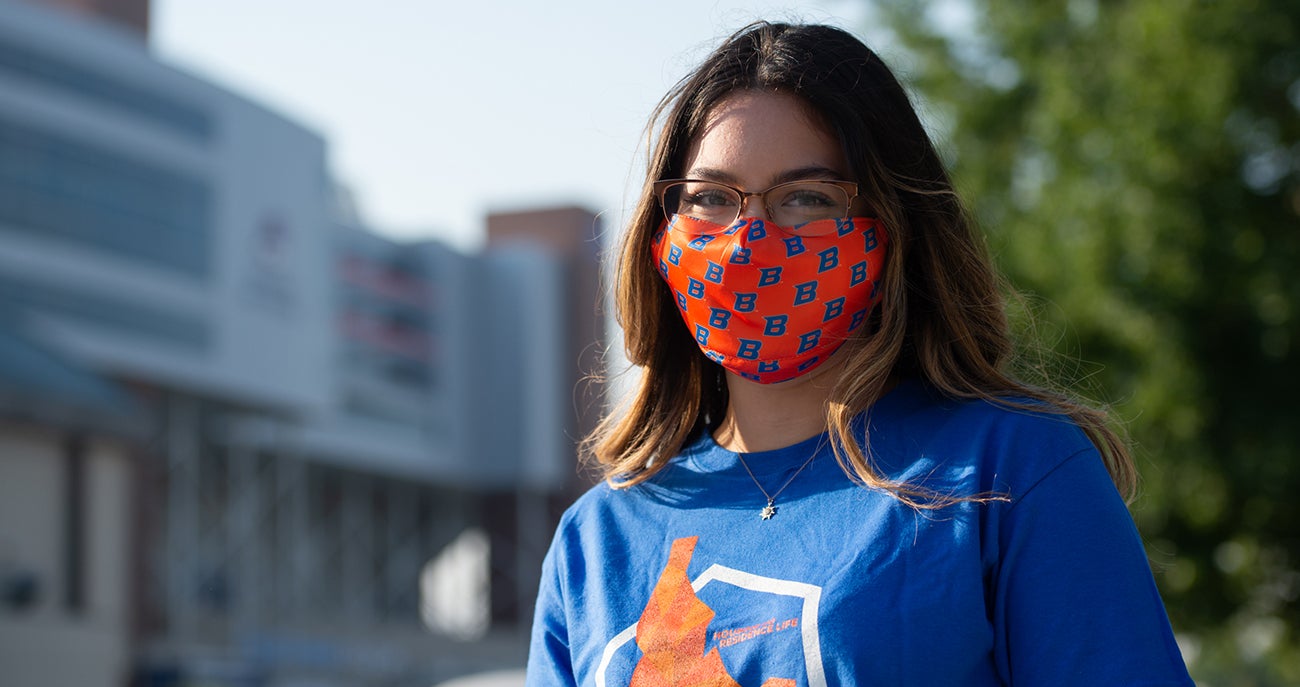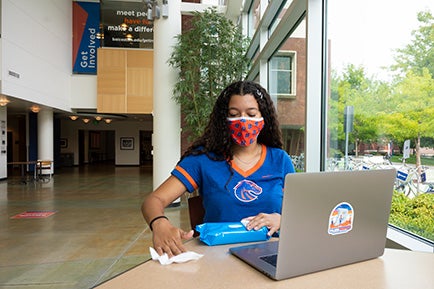
Layered prevention strategies can help protect individuals from catching a respiratory virus, decrease illness severity, and prevent campus and community infections.
For additional resources and guidance, we encourage you to visit Wellness Services whose mission is to provide preventative health education, advocacy, and resources to empower the Boise State Community to prioritize well-being.
Get Vaccinated and Stay Up to Date with Your Vaccinations.
We strongly encourage but do not require students to be vaccinated.
Getting vaccinated is the best way to slow the spread of respiratory viruses and prevent severe illness, hospitalizations, and death.
CDC recommends that everyone eligible stay up to date on their COVID-19 vaccines.
The COVID-19 and flu vaccines and boosters are available on campus to both Boise State students and staff, as well as the general community.
Please Note:
Our vaccines are IN and we are open every Thursday and Friday from 8:30AM to 5PM!
If you have questions about vaccination, or about how to make an appointment on campus, please visit our Public Health Vaccination Clinic page.

Wear a Facial Covering if You have been Recently Ill and are Still Recovering.
Facial covering use can provide an extra layer of protection from respiratory illness, especially during periods of time or in places associated with high transmission.
High-quality facial coverings such as N95s and KN95s are recommended by the CDC to protect the wearer.
Ensuring the right fit is also an important factor in using facial coverings to protect yourself and others from COVID-19.
| Type of Facial Covering | How They Work |
|---|---|
| N95 Masks | Filters both large and small particles from the air as the wearer breathes in. Offers the highest level of protection. |
| KN95 Masks | Filters both large and small particles from the air as the wearer breathes in. Offers more protection than a surgical mask. |
| Surgical or Medical Masks | Filters large particles from the air as the wearer breathes in and protects the wearer from respiratory droplets released by others. |
| Cloth Masks | Traps respiratory droplets released by the wearer when talking, coughing or sneezing. Filters respiratory droplets released by others when the wearer breathes in. Most effective when made of multiple, tightly woven layers of fabric, like cotton. |
More information on facial coverings from the CDC:
- Types of facial coverings and respirators.
- Wear facial coverings with the best fit, protection, and comfort for you.
Free KN95 and medical masks for the Boise State campus community are available for pick-up at the front desk of Campus School, in Human Resources, at the Information Desk in the Student Union Building, and the front desk of each residence hall.
Maintain Healthy Habits
Wash Your Hands Often

Wash your hands frequently with soap and water for at least 20 seconds. Especially before eating or preparing food, before touching your face, after using the restroom, after leaving a public place, after blowing your nose, coughing, or sneezing, after handling your mask, after changing a diaper, and after caring for someone sick.
If you are not able to wash your hands, use hand sanitizer that contains at least 60% alcohol.
Cover Coughs and Sneezes
Always cover your mouth and nose with a tissue when you cough or sneeze, or use the inside of your elbow and do not spit.
Throw used tissues in the trash.
Immediately wash your hands with soap and water for at least 20 seconds. If soap and water are not readily available, clean your hands with a hand sanitizer that contains at least 60% alcohol.
If you are wearing a mask: You can cough or sneeze into your mask. Put on a new, clean mask as soon as possible and wash your hands.
Clean and Disinfect

Clean high-touch surfaces (e.g. tables, doorknobs, light switches, countertops, handles, desks, phones, keyboards, toilets, faucets, and sinks) regularly or as needed and after you have visitors.
If someone in your home or office is sick, clean surfaces using a product from EPA’s List N: Disinfectants for respiratory illness according to the manufacturer’s labeled directions. Clean dirty surfaces using detergent or soap and water before disinfection.
Sleep
Good sleep helps your immune system to function properly and to fight off potential infection and disease. The Centers for Disease Control and Prevention recommends a minimum of 7 hours of sleep each night for college adults. Other tips for better sleep include maintaining a consistent sleep schedule; limiting daytime naps to no more than one hour and avoiding napping late in the day; exercising regularly; avoiding caffeine and large meals before bedtime and keeping your room cool, dark, and quiet.
Eat Well
Eating a balanced diet of vegetables, fruits, whole grains, lean meats, and dairy is important for maintaining your health and fighting off infection. Certain nutrients like Vitamin C (found in fruits and vegetables like citrus fruits, red and green peppers, and broccoli), Vitamin D (found in salmon, tuna, mushrooms, milk, and fortified milk alternatives), and Zinc (found in red meat, poultry, seafood, nuts, beans, and seeds) may also help to increase immune function.
Engage in Movement
Maintaining an active lifestyle is associated with lower levels of anxiety and depression, better sleep, improved cognitive function, and increased academic success. Stay in motion by finding ways to keep active at home, outside, or on campus.
Go Outside
Spending time outdoors can positively impact your physical and mental well-being. Studies show that being outside in green spaces can improve moods, reduce stress, improve sleep, and reduce health risks.
Reduce Stress
It is normal to feel elevated stress or anxiety levels when experiencing challenges or unique circumstances. Check in with yourself regularly and stay in tune with your emotional health by maintaining normalcy as much as possible. Take breaks from constant news and social media updates and engage with activities you enjoy to unwind. Try practicing mindful activities like stretching, breathing, or meditation to help you to relax. Talk with people you trust about your concerns and how you are feeling.
Monitor your Health
If you are feeling sick and experiencing symptoms you can also schedule in-person or telehealth appointments through the university’s health services, or can obtain on-campus COVID-19 and flu testing through Boise State’s Public Health Clinic.
If you test positive for COVID and your symptoms continue for four weeks or longer, you may be experiencing long COVID or post-COVID conditions.
Commitment to Keeping Campus Healthy
Boise State University is committed to providing a safe working, learning, and living environment for all campus community members by preventing and/or minimizing the spread of Communicable Diseases, including COVID-19 and flu.
All Boise State students, faculty, and staff must adhere to all health and safety requirements as listed in our Communicable Disease (Policy 9270) page.